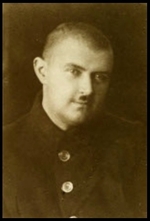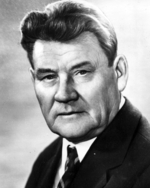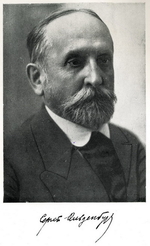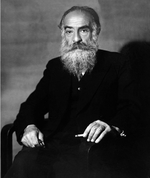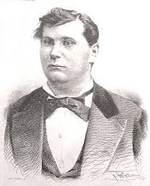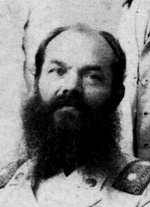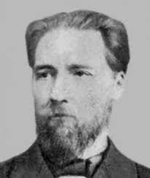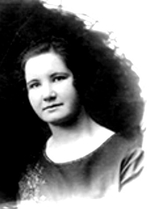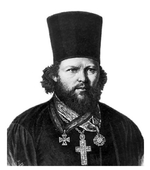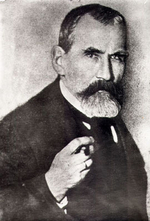Articles
Obermiller Eugeny (1901–1935)
Obermiller Eugeny (1901–1935) – orientalist – specialist in Buddhism, Tibet, Sanskrit, Mongols, and in the field of complex research of culturally close peoples of India, Tibet, and Mongolia.
He graduated from the Ethnological and Linguistic Department of the Faculty of Social Studies of the Leningrad University (Far East Section); his supervisors were I. I. Tolstoy and Th. I. Stcherbatsky. In 1925, he worked at the ‘Bibliotheca Buddhica’ Magazine at the Ac. of Sc. In 1926-1931, he annually traveled to Buryat-Mongolian Autonomous Soviet Socialist republic, where he made his studies at one of the oldest Datsan of Buryatia – Atsagat Dazan. They said, he had an exclusive gift to languages and great diligence at work. In the course of his travels to Buryatia he worked with local educated Lamas on translation and studying Tibetan philosophical texts, took part in philosophical disputations.
Read More
Okladnikov Aleksey (1908‒1981)
Okladnikov Aleksey (1908‒1981) – archeologist, historian, ethnographer.
He enrolled at the Irkutsk Teachers-Training Institute in 1925. In 1926, he published his first research work ‘Neolithic Sites on Upper Lena’. In 1934, he entered the post-graduate courses of the State Academy of the History of Material Culture.
In 1926-1937, he worked in Irkutsk as Director of the Local History Museum. In 1938-1961, he worked as Researcher at the State Academy of the History of Material Culture (later Institute of the History of Material Culture, and later the Leningrad Branch of the Institute of Archeology) of the Ac. of Sc. of the U.S.S.R. From 1961 till 1966, he was Head of the Department of Humanitarian Studies of the Institute of Economic of the Siberian Branch of the Ac. of Sc. of the U.S.S.R. In 1966, he became Director of the Institute of History, Philology and Philosophy of the Siberian Branch of the Ac. of Sc. of the U.S.S.R.
Read More
Oldenburg Sergey (1863–1934)
Oldenburg Sergey (1863–1934) – orientalist, specialist in Indian studies.
He got the golden medal finishing the First Warsaw Gymnasium (1881); then he graduated from the Sanskrit-Persian Group of the Faculty of Oriental Languages of the St. Petersburg University (1885, Candidate thesis ‘An Essay of Phonetic and Morphology of the Prakrit Dialect of Magadhi’). Master in Sanskrit literature (1895, Master thesis ‘Buddhist Legends. Part I: Bhadrakalpavadana Jatakamala’). A member of a group ‘Brethen’ formed in 1880-s; there were young intellectuals who studied at the St. Petersburg University (among them: V. I. Vernadsky, D. I. Shakhovskoy, A. A. Kornilov, I. V. Grevs). In 1887-1889, O. worked in libraries of Paris, London, and Cambridge, mainly with Buddhist manuscripts. Since 1889, he was Ass. Docent of the Faculty of Oriental Languages of the St. Petersburg University; he also taught Sanskrit at the Historical and Philological Faculty.
Read More
Orbeli Joseph (1887‒1961)
Orbeli Joseph (1887‒1961) – orientalist. Academician of the Ac. of Sc. of the U.S.S.R. (1935).
In 1904, he enrolled at the Classic Department of the Historical and Philological Faculty of the St. Petersburg University; graduated from it in 1909. At the same time, in 1907-1911, he visited classes at the Armenian-Georgian-Persian Group of the Faculty of Oriental languages. Among his teachers were: V. A. Zhukovsky, S. F. Oldenburg, V. V. Bartold, P. C. Kokovtsov, B. A. Turaev, but his main supervisor was N. Ya. Marr. Under his supervision, O. Participated in the excavations of the ancient Armenian capital of Ani in 1906-1910.
In 1911-1912, he was sent by the Ac. of Sc. to Turkish Armenia, where he studied and collected materials in the dialect of the Armenian people of the district of Moksa; later he made a special dialectological dictionary.
Read More
Osokin Nikolay (1839‒1895)
Osokin Nikolay (1839‒1895) – historian, social activist.
After a gymnasium in St. Petersburg, he entered the Historical and Philological Faculty of the St. Petersburg University (1860), after two years he was transferred to the similar faculty of the Kazan University, and graduated from it with golden medal (1865). His Candidate work was ‘Savonarola and Florence’ (published in the ‘Epoch’ Magazine, 1864). He stayed at the Kazan University and prepared his Master thesis ‘The History of Albigenses and Their Time” (1865‒18674 the work was published in 1869).
Since 1867, he has been Associated Professor at the Chair of the World History at the Kazan University. In 1872, he got the Doctor degree (thesis ‘The First Inquisition and the Conquer of Languedoc by Frenchmen’ was written on the base of archive sources studied by him in France) he became Full Professor and Chair of the World History at the Kazan University. Several times, he visited Europe for his archival studies.
Read More
Ostroumov Nickolay (1846–1930)
Ostroumov Nickolay (1846–1930) – specialist in Islamic studies, Turkologist.
In 1860-1866, he studied at the Tambov Seminary, then, in 1866-1870 – at the Kazan’ Spiritual Academy, at the Missionary Department of Anti-Islamic Disciplines, where he learnt Turk and Arabic languages. His supervisors were N. I. Iliynsky and G. S. Sablukov.
At the Kazan’ Spiritual Academy O. got his Master degree in theology for his thesis ‘Critical Analysis of the Mohameddan Doctrine on Prophets’ (1870, publ. in 1874); he was left there as a teacher in the history and doctrine of Islam, Tartar and Arabic languages. In 1877, he mowed to Tashkent, where he worked as Inspector of popular schools, then he became Director of the Teachers-Training Seminary, and later – Director of the local gymnasium.
Read More
Palmov Ivan (1855–1920)
Palmov Ivan (1855–1920) – historian of Rthodoxy, specialist in Slavic studies.
In 1876, he graduated from the Ryazan Theological Seminary and entered the St. Petersburg Theological Academy (graduated in 1880). He successfully defended his Master thesis ‘The Hussite Movement. The Issue of the Chalice in the Hussite Movement’ (St. Petersburg, 1881). From 1882 to 1884, he was on a business trip in Southern and Eastern Europe, working in libraries and archives of Austria, Bulgaria, Greece, Romania, Serbia, Turkey, and Czech. In 1890, he published a book about those travels and about his work: ‘From a Journey through the Greco-Slavic Lands’ (1890).
Read More
Palvadre Martha (1896–1937)
Palvadre Martha (1896–1937) – ethnographer.
In 1928, she graduated from the Ethnographical Department of the Geographical Faculty of the Leningrad State University, with the specialization in the ethnography of Finnish Peoples; she studied at the post-graduate courses of the Chair of Finno-Ugric Ethnography of the Leningrad State University (1928-1932).
In 1933-1934, she worked at the State Academy of the History of material Culture; since 1932, she was Academic Secretary of the Institute on Studying the Peoples of the U.S.S.R. of the Ac. of Sc. of the U.S.S.R.
Read More
Pavsky Gerasim (1787–1863)
Pavsky Gerasim (1787–1863) – philologist, specialist in Hebrew studies, founder of Russian school of Biblical studies.
Doctor in Theology, Professor of the St. Petersburg Spiritual Academy, Professor of the St. Petersburg University, Academician of the Ac. of Sc.
He was born in the family of a priest, studied at the St Aleksander Nevsky Seminary, then – at the St. Petersburg Spiritual Academy; 1811, he graduated from the Academy with the Master degree in Theology (his thesis ‘A Survey of the Book of Psalms: An Attempt of Archeological, Philological and Hermeneutical Analysis’). He worked at the Academy as Bachelor of the Chair of Hebrew Language; since 1818, he was Professor. He worked at the same chair till 1835.
Read More
Pekarsky Eduard (1858–1934)
Pekarsky Eduard (1858–1934) – ethnographer, linguist.
In 1877, after a classical gymnasium in Chernigov, he enrolled to the Kharkov Veterinary Institute; in 1878, he was excluded for his participation in students’ protests. He started his revolutionary activity in gymnasium years – as early as in 1874; in 1878, he entered the group ‘Zemlya i Volya’ (Land and Freedom). In December 1879, he was arrested, and on January 12, 1881, the Moscow Military District Court sentenced him to 15 years of had labour, but at the last moment it was changed with exile in the distant part of Siberia ‘with deprivation of all rights and property’. He arrived to Yakutsk in 1881; then he was sent from there to the First Igideisky Nasleg of the Boturussky Ulus (now Tattinsky Ulus), where he learnt Yakutian language. After a while, it became his life affair.
Read More
Showing 201-210 of 351 items.

